Vehicles Names | Meaning & Picture | Vehicles Vocabulary | Necessary Vocabulary
Vehicle | Transport | Motor | Traffic Name
Vehicle / ˈviːəkl / (ˈভীএকল্) n [a thing usually with wheels and a handle, that is used for transporting people or goods from one place to another, such as a car, truck, cart, bicycle etc.] (যান, যানবাহন): A truck driver died last night when his vehicle overturned. The vehicle impounded as part of the police investigation. Two drivers escaped injury when their vehicles collided near Thirsk. The vehicle crossed the road and hit a truck head-on. Car owners whose vehicles have been towed (away). Tighter controls on vehicle emissions. Vehicles running on biodiesel/lead-free petrol. A vehicle run over the man. A vehicle accident/crash.
Vehicle Related Necessary Vocabulary Note
Ø Drive / draɪv / (ড্রাইভ্) v {drives / draɪvz / (ড্রাইভ্য্); Pt. drove / droʊv / (ড্রৌভ্); Pp. driven / drɪvn / (ড্রিভন্)} [to operate a vehicle so that it goes in a particular direction] (<মোটরগাড়ি বা যানবাহন>চালনা করা): I drove my daughter to school. He was arrested for driving recklessly.
<NOUN> Drive [a journey in a car or other vehicle] (মোটর গাড়িতে ভ্রমণ): It’s a long drive from Glasgow to London.
<NOUN> Driver / draɪvər / (ড্রাইভএর্) n [someone who drives a vehicle] (<যানবাহনের> চালক): A student driver was injured in the accident.
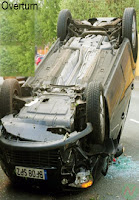 |
| Overturn |
Ø Overturn / ˌoʊvərˈtɜːrn / (ˌওউভএর্ˈটা্র্ন্) v {Pt. Pp. overturned} [Sth turns upside down or on its side] (উলটে যাওয়া বা উলটে ফেলা): The motor skidded off the road, hit a tree and overturned.
Ø Impound / ɪmˈpaʊnd / (ইম্ˈপাউন্ড্) v {Pt. Pp. impounded / ɪmˈpaʊndɪd / (ইম্ˈপাউন্ডিড্)} [(of the police, courts of law, etc.) to take Sth away from Sb, so that they can not use it] (আইন বা ক্ষমতাবলে দখল করা; আটক/ক্রোক করা): The vehicle was impounded by customs.
<SYN> Confiscate
Ø Escape / ˈɪskeɪp / (ˈইস্কেইপ্) v {Pt. Pp. escaped / ˈɪskeɪpt / (ˈইস্কেইপ্ট্)} [to get free from Sth, or to suffer no harm or less harm than expect] (মুক্তি পাওয়া; বেচে যাওয়া): Both drivers escaped unhurt. A lion has escaped from its cage.
Ø Injury / ˈɪndʒəri / (ˈইন্জএরি) n [harm is done to a person’s or an animal’s body, caused by an accident or an attack] (আহত; পীড়া): Several bus passengers received/sustained serious injuries in the crash.
Ø Collide / kəˈlaɪd / (কএˈলাইড্) v {Pt. Pp. collided / kəˈlaɪdɪd / (কএˈলাইডিড্)} [(especially of moving objects) to hit Sth violently] (<পরস্পর প্রচণ্ড> ধাক্কা খাওয়া): The two vans collided at the crossroads.
Ø Hit / hɪt / (হিট্) v {hits / hɪts / (হিটছ্); Pt. Pp. hit} [to come against Sth/Sb with force, especially causing damage or injury] (<কিছুর সঙ্গে>সজোরে চোট খাওয়া): The bus hit the bridge.
Ø Head-on / hed-ɔːn / (হেড্-ওন্) adj [describes an accident in which the front of two vehicles hit each other] (<সংঘর্ষ সম্বন্ধে>মুখোমুখি): a head-on crash/collision
 |
| Tow |
Ø Tow / toʊ / (টৌ) v {Pt. Pp. towed / toʊd / (টৌড্)} [to pull a car, boat, etc. along, using a rope or a chine tied to another vehicle or boat] (রশি বা শিকল দিয়ে টেনে নেওয়া): The damaged bus was towed to safety.
Ø Emission / iˈmɪʃn / (ইˈমিশন্) n [an amount of gas, heat, light, etc. that is sent out into the air] (নির্গতকরণ; প্রেরণ): We must take action to cut vehicle emissions.
Ø Biodiesel / ˈbaɪoʊdiːzl / (ˈবাইওউডীযল্) n [a type of fuel made from vegetable oils or animals fat and used in diesel engines which is less harmful to the environment] (<প্রাণীজ>জ্বালানী বা ডিজেল):
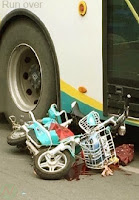 |
| Run over |
Ø <PHR-V> Run over [(of a vehicle or its driver) to knock a person or an animal down and drive over their body or a part of it] (<যানবাহন>চাপা দেওয়া): Two children were run over and killed.
Ø <PHR-V > Run Sth into Sth [to make a vehicle crash into Sb/Sth] (ধাক্কা লাগানো): He ran his motorbike into a tree.
Ø Accident / ˈæksɪdənt / (ˈএ্যাকছিডএন্ট্) n [an unpleasant event, especially in a vehicle, that happens unexpectedly and causes injury or damage] (দুর্ঘটনা): One in seven accidents is caused by sleepy drivers.
Ø Crash / kræʃ / (ক্র্যাশ্) n [an accident, especially one which damages a vehicle] (বিধ্বস্ত হওয়া): He had a crash on the way to work. A car/plane crash
<VERB> Crash / kræʃ / (ক্র্যাশ্) v {crashes / kræʃɪz / (ক্র্যাশিয্); Pt. Pp. crashed / kræʃt / (ক্র্যাশট্)} [to have an accident, especially one hits objects or other vehicles, causing damage] (পতন; বিধ্বস্ত): A truck went out of control and crashed into the back of a bus.
Transport / ˈtrænspɔːrt / (ˈট্র্যান্ছ্পোর্ট্) n {US transportation} [a system or movement for carrying humans, animals, and goods from one location to another] (পরিবহন; যাতায়াত-ব্যবস্থা): We provide transport to and from school. Do you have own transport (= vehicle)? The region has good transport links. The car broke down, leaving us without transport. Air/freight/road transport
<VERB> Transport {Pt. Pp. transported} [to take Sth/Sb from one place to another in a vehicle] (<মাল অথবা মানুষ>আনা-নেওয়া করা; পরিবহন করা): The pipeline was constructed to transport oil across Alaska to ports on the coast. 162000 British convicts were transported to Australia from 1788 to 1868 for life.
Ø Goods / gʊdz / (গুডয্) n [things (not people) that are transported by rail or road] (মাল বা মালামাল): a heavy goods vehicle
Ø Provide / prəˈvaɪd / (প্রএˈভাইড্) v {SYN supply} [to give Sth to Sb or make it available for them to use] (দেওয়া; যোগানো; সরবরাহ করা): We are here to provide a service for the public.
Ø Link / lɪŋk / (লিঙক্) n [a means of traveling or communicating between two places] (যোগাযোগ): a high-speed rail link
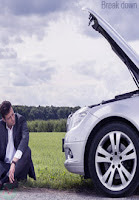 |
| Break down |
Ø Break down [(of a machine or vehicle) to stop working because of a fault] (<যন্ত্র বা যানবাহন>খারাপ বা অচল হয়ে পড়া): Our car broke down and we had to push it off the road.
Ø Air / er / (এর্) n 1. [travel in an aircraft] (বিমানে ভ্রমন): an air travel/disaster
2. Air / er / (এর্) n [the mixture of gases that surrounds the earth and that we breathe] (বায়ু বা বাতাস): I went outside to get some fresh air. I need to put some air in my tires.
Ø Freight / freɪt / (ফ্রেইট্) n [goods that are transported by ships, planes, trains or lorries/truck; the system of transporting goods in this way] (<সকল পথে>পণ্য পরিবহণ): Will the goods be sent by air or sea freight? A freight business
Motor / ˈmoʊtər / (ˈমৌটএর্) n [a device that uses electricity, petrol/gas, etc. to produce movement and makes a machine, a vehicle, a boat, etc. work] (<যে যন্ত্র শক্তি বিশেষত তড়িৎশক্তি ব্যবহার করে গতি উৎপাদন করে>চালক যন্ত্র; মোটরযান): You need a motor jack in order to change a tire. He started the motor. He left the motor running. I have had a new motor (= engine) put in my car. A boat with a powerful outboard motor.
Ø Jack / dʒæk / (জ্যাক্)
n [a device for lifting heavy objects, especially one for raising vehicle off
the ground so that a wheel can be changed] (<গাড়ি>উত্তলক যন্ত্র):
 |
| Jack |
Ø Device / dɪˈvaɪs / (ডিˈভাইছ্) n [an object or a piece of equipment that has been designed to do a particular job] (কল, যন্ত্র): an electronic device
Ø Start / stɑːrt / (স্টাঃর্ট্) v [when you start a machine or a vehicle or it starts, it begins to operate] (<ইনজিন ইত্যাদি>চালু করা): The car won’t start.
Ø Outboard / ˈaʊtbɔːrd / (ˈআউট্বোর্ড্) n [on, towards or near the outside of a ship or an aircraft] (জাহাজ বা নৌকার প্রান্তদেশে স্থাপিত): a boat with an outboard motor
Traffic / ˈtræfɪk / (ট্র্যাফিক্) n [the number of vehicles moving along roads, or the amount of aircraft, trains or ships moving along a route at a particular time] (যানবাহন; গমনাগমন): They were stuck in traffic and missed their flight. Traffic clogs the streets of the city center.
Ø Stick / stɪk / (স্টিক্) v {sticks / stɪks / (স্টিক্ছ্); Pt. Pp. stuck / stʌk / (স্টাক্)} [to become fixed in one position and impossible to move] (কোনো জায়গায় আটকে যাওয়া):
<SYN> Jam
Ø Clog / klɑːg / (ক্লাঃগ্) v [to block Sth or to be become blocked] (<কোনোকিছু দ্বারা>চলাচল ব্যাহত হওয়া): The roads are clogged with holiday traffic.
Car
Car / kɑːr / (কাঃর্) n {UK motor car; US automobile} [a road vehicle with an engine and four wheels that can carry a small number of people] (মোটরগাড়ি): The back of the car was badly dented in the collision. The car’s paintwork is badly scratched. He pulled his car over at a small hotel. He swerved his car sharply to the right. Her car skidded on a patch of ice. The car does 55 miles per gallon. The car was doing over 100 miles an hour. I decided to buy a second-hand car. A car has Wing mirror; Rear-view mirror; Visor; Windscreen; Windscreen wiper; Dashboard; Glove compartment; Satnav; Steering wheel; Tachometer; Fuel gauge; Horn; Ignition; Milometer; Brake; Clutch; Accelerator; Gear leaver; Headrest; Passenger seat; Handbrake; Seatbelt; Wing; Bonnet; Number plate; Headlight; Tire; Hubcap; Trunk; Bumper; etc.
Ø Wheel / wiːl / (উঈল্) n [one of the round objects under a car, bicycle, bus, etc. that turns when it moves] (চক্র, চাকা): I got my bag caught in the wheel of my bicycle.
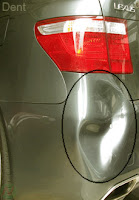 |
| Dent |
Ø Dent / dent / (ডেন্ট্) v [to make a small hollow mark in the surface of Sth, usually by hitting] (<আঘাতের ফলে>সৃস্ট ছোট গর্ত; টোল):
Ø Collision / kəˈlɪʒn / (কএˈলিজন্) n [an accident in which two vehicles or people crash into each other] (সংঘর্ষ; ধাক্কা): a head-on collision between two trains
Ø Paintwork / ˈpeɪntwɜːrk / (ˈপেইন্ট্ওয়ার্ক্) n [the layer of paint on the surface of a door, wall, car, etc.] (লাগানো রং): The paintwork is beginning to peel.
Ø Scratch / skrætʃ / (স্ক্র্যাচ্) v [to damage the surface of Sth, especially by accident, by making thin shallow marks on it] (আঁচড়/ঘষার দাগ লাগা/দেওয়া): Be careful not to scratch the furniture.
Ø Pull / pʊl / (পুল্) v [to move or make a vehicle move sideways] (<যানবাহন>একদিকে নিয়ে যাওয়া): She pulled the car to the right to avoid the dog.
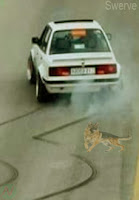 |
| Swerve |
Ø Swerve / swɜːrv / (সোয়াঃর্ভ্) v [(especially of a vehicle) to change direction suddenly especially in order to avoid hitting Sb/Sth] (<যানবাহনের>হঠাৎ গতি পরিবর্তণ করা বা করাণো): The bus driver swerved to avoid hitting the cyclists.
Ø Skid / skɪd / (স্কিড্) v [(especially of a vehicle) to slide sideways or forwards in an uncontrolled way] (<গাড়ি সম্বন্ধে>কাত হয়ে হড়কাতে হড়কাতে চলা): Their bus skidded on some ice and hit a tree.
Ø Second-hand / ˈsekənd-hænd / (ˈছেকএন্ড্-হ্যান্ড্) n [not new; having been used in the past by someone else] (পুরাতন ও ব্যবহৃত): This bike is second-hand but it’s still in good condition.
Ø Wing mirror / ˈwɪŋ mɪrər / (ˈউইঙ্ মিরএর্) n {US side-view mirror} [a mirror on the outside of a car door which allows the driver to the vehicles that are behind or overtaking] (<যানবাহনের>পার্শ্ব আয়না):
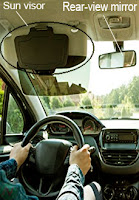 |
Rear-View Mirror
& Sun Visor
|
Ø Rear-view mirror / ˌrɪr- vjuː ˈmɪrər / (ˌরিএর্-ভ্যিউ ˈমিরএর্) n [a rear-view mirror in which a driver can see the traffic behind] (<চালকের কপালের উপরে লাগান> পেছনে দেখার আয়না):
Rear / rɪr / (রিএর্) n [the back part of Sth] (পিছনের দিক; পশ্চাৎ):
Ø Sun visor / ˈsʌn ˌvaɪzər / (ˈছান্ ˌভাইযএর্) n {Also visor} [a flat piece at the top of the window of a vehicle which protects the driver’s eyes from the strong sun] (<রোদ থেকে চালকের চোখ বাচাতে গাড়ির সামনের কাঁচের উপর লাগানো>আতপত্র):
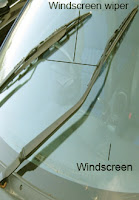 |
| Windscreen & Windscreen wiper |
Ø Windscreen / ˈwɪndskriːn / (ˈউইন্ড্স্ক্রীন্) n {US windshield} [the window at the front of a car, truck, etc.] (<যানবাহনের>সামনের কাঁচ): He scraped the windscreen free of ice.
Ø Windscreen wiper / ˈwɪndskriːn waɪpər / (ˈউইন্ড্স্ক্রীন্ ওয়াইপএর্) n {US windshield wiper} [a blade with a rubber edge that moves across a windscreen to make it clear of rain, snow, etc.] (<গাড়ির সামনের কাঁচ পরিষ্কারের>সম্মার্জনী, সম্মার্জক):
Ø Dashboard / ˈdæʃbɔːrd / (ˈড্যাশ্বোর্ড্) n {Also fascia} [the part of a car in front of the driver that has instrument and controls in it] (<মোটর গাড়িরতে বাতাবরণের নীচে বেগমাপক যন্ত্র, বিভিন্ন নিয়ন্ত্রণ-কৌশল ইত্যাদি যুক্ত>ফলক বা নিয়ন্ত্রণ-পীঠ):
Ø Glove compartment / ˈglʌv kəmˈpɑːrtmənt / (ˈগ্লাভ্ কএম্ˈপাঃটমএন্ট্) n {Also glove box} [a small cupboard or shelf in the front of a car, used for keeping small things in] (মোটরগাড়ির নিয়ন্ত্রণ-পীঠের ছোট খুপরিতে ছোট খাট জিনিসপত্র রাখার জায়গা):
Ø Satnav / ˈsætnæv / (ˈছ্যাটন্যাভ্) n [the abbreviation for ‘satellite navigation’: a system of computers and satellites, used in cars and other places that tell you where Sth is, where you are, or how to get to a place] (গাড়িতে কৃত্রিম উপগ্রহ ও কমপিউটার ব্যবস্থা; স্যাটন্যাভ): The drivers all have satnav in the van.
Ø Steering wheel / ˈstɪrɪŋ wiːl / (ˈস্টিরিঙ্ উঈল্) n [a wheel in a vehicle which the driver turns in order to make the vehicle go in a particular direction] (<গাড়ির>হালচালনা; স্টিরিং উঈল): Turn the steering wheel hard to the right.
Ø Tachometer / tæˈkɑːmɪtər / (ট্যাˈকাঃমিটএর্) n {Also rev counter} [a device that measures the rate that Sth turns and is used to measure the speed of an engine in a vehicle] (<মটোর গাড়ির>গতিমাপক যন্ত্র):
Ø Gauge / geɪdʒ / (গেইজ্) n {Also gage} [(often in compounds) an instrument for measuring the amount or level of Sth] (পরিমাপের মান; মাপ): a fuel/petrol, etc. gauge
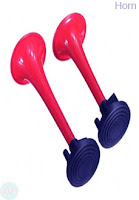 |
| 1. Horn |
Ø Horn / hɔːrn / (হোর্ন্) n 1. [a device on a vehicle that is used to make a loud noise as a warning or signal to other people] (ভেঁপু; শিঙ্গা): The driver blew/sounded/honked her horn. Behind him, a horn blared.
 |
| 2. Horn |
2. Horn / hɔːrn / (হোর্ন্) n [a hard, pointed, often curved part that grows, usually in pairs, on the heads of some animals, such as sheep and cows] (শিং):
Ø Ignition / ɪgˈnɪʃn / (ইগ্ˈনিশন্) n [the electrical system in an engine that causes the fuel to burn or explode in order to start the engine] (<ইনজিনে>বিস্ফোরক গ্যাসের মিশ্রণে আগুন ধরানোর জন্য বৈদ্যুতিক যন্ত্র কৌশল; দীপন): Switch/Turn ignition on/off.
Ø Milometer / maɪˈlɑːmɪtər / (মাইˈলাঃমিটএর্) n {US odometer} [a device in a vehicle that measures and shows the numbers of miles it has traveled] (মাইল মিটার):
Ø Brake / breɪk / (ব্রেইক্) n [a device which makes a vehicle go slower or stop, or a pedal, bar or handle which makes this device work] (<যানবাহনের চাকার> গতিরোধক যন্ত্রবিশেষ): He stopped with a squeal/screech of the brakes. She slammed on the brakes to try to avoid the dog.
<VERB> Brake / breɪk / (ব্রেইক্) v [to go slower or make a vehicle go slower using the brake] (গাড়ি থামানোর জন্য ব্রেক করা বা কষা): The truck braked to a halt.
Ø Clutch / klʌtʃ / (ক্লাচ্) n [the pedal in a car or other vehicle that you press with your foot so that you can change gear] (<গাড়ি নিয়ন্ত্রের যন্ত্র>ক্লাচ): Push the clutch in, put the car into gear, rev the engine and then gently let the clutch out.
Ø Accelerator / əkˈseləreɪtər / (এক্ˈছেলএরেইটএর্) n {Also gas pedal} [the pedal in a car or other vehicle that you press with your foot to control the speed of the engine] (<গাড়ি বা যন্ত্রের>গতিনিয়ন্ত্রক কৌশল, যেমন মোটর যানের পাদানি; বেগবর্ধক):
Ø Gear lever / ˈgɪr ˈlevər / (ˈগিএর্ ˈলেভএর্) n {US gear shift} [a metal rod that you use to change gear in a car or other vehicle] (<গাড়ির>গিয়ার চালু বা বন্ধ করার কল):
Ø Headrest / ˈhedrest / (ˈহেড্রেস্ট্) n [the part of a seat or chair that supports a person’s head, especially on the front seat of a car] (গাড়ির আসনে যেখানে মাথা হেলান দেওয়া হয়):
 |
| Headrest |
Ø Passenger seat / ˈpæsɪndʒər siːt / (ˈপ্যাছিনজএর্ ছীট্) n [the seat in a car which is next to the driver’s seat] (কারের ড্রাইভারের পাশের আসন):
Ø Handbrake / ˈhændbreɪk / (ˈহ্যান্ড্ব্রেইক্) n {US emergency brake} [a device operated by hand which locks into position and prevent a vehicle from moving] (হাত ব্রেক): You are supposed to put the handbrake on whenever you stop on a hill.
Ø Seat belt / siːt belt / (ছীট্ বেল্ট্) n {Also safety belt} [a belt that is attached to the seat in a car or a plane and that you fasten around yourself so that you are not thrown out of the seat if there is an accident] (<যাত্রীদের>কটিবন্ধ): You must wear your seat belt.
Ø Wing / wɪŋ / (উইঙ্) n {US fender} [a part of a car that is above a wheel] (মটরগাড়ির চাকার উপরের অংশ): There is a dent in the left-wing.
 |
| Bonnet |
Ø Bonnet / ˈbɑːnət / (ˈবাঃনএট্) n {US hook} [the metal cover over the part of a car where the engine is] (মোটর গাড়ির ইঞ্জিনের ঢাকনি):
Ø Number plate / ˈnʌmbər pleɪt / (ˈনামবএর প্লেইট্) n {US license plate} [a metal or plastic plate on the front and back of a vehicle that shows its registration number] (<মোটরযানের>নম্বর ফলক): She could just about the number plate of the car speeding away from the accident.
Ø Headlight / ˈhedlaɪt / (ˈহেড্লাইট্) n {UK head lamp} [a large powerful light, usually one of two, at the front of a vehicle; the beam from this light] (হেডলাইট): He dipped his headlights (= directed the light downwards) for the oncoming traffic.
Ø Tire / ˈtaɪər / (ˈটাইএর্) n {UK tyre} [a thick rubber ring, which is fitted around the outer edge of the wheel of a vehicle, and to travel over the ground more easily] (টায়ার): bald/worn tires; to pump up a tire
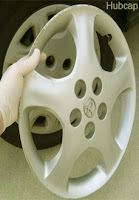 |
| Hubcap |
Ø Hubcap / ˈhʌbkæp / (ˈহাবক্যাপ্) n [the circular covering over the hub (= central part) of the wheel of a car or other motor vehicle] (চাকার কেন্দ্রস্থলের ঢাকনা):
Ø Trunk / trʌŋk / (ট্রাঙক্) n {UK boot} [the space at the back of a car that you put bags, cases, etc. in] (গাড়ির পিছনে যেখানে মাল রাখা হয়; তোড়ং): I always keep a spare tyre in a trunk for emergencies.
Ø Bumper / ˈbʌmpər / (ˈবাম্পএর্) n [a long bar fixed to the front and back of a car, etc. to reduce the effect if it hits anything] (<সংঘর্ষের প্রকোপ কমানোর জন্য বাস, মোটরগাড়ির সামনে-পিছনে>সংযোজিত বারণী; বাম্পার): The cars crawled along bumper to bumper.
Station Wagon
Station wagon / ˈsteɪʃn ˈwægən / (ˈস্টেইশ্ন্ ˈওয়্যাগএন্) n [a car with a lot of space behind the back seats and an extra door at the back for loading in large objects] (স্টেশ্ন্ ওয়াগন):
Buggy
Buggy / ˈbʌgi / (ˈবাগি) n [a small car, often without a roof or doors, which is designed for driving on rough ground and used for a particular purpose] (বাগি): a golf/garden/dune buggy
Ø Rough / rʌf / (রাফ্) adj [having a surface that is not even or regular] (অসমতল; এবড়ো-থেবড়ো): The car is designed for traveling over rough ground.
Ø Dune / duːn / (ডূন্) n {Also sand dune} [a small hill of sand formed by the wind, near the sea or in a desert] (সমুদ্র উপকূলে বা মরুভূমিতে বায়ু প্রবাহে সৃষ্ট বালির স্তুপ; বালিয়াড়ি):
Limousine
Limousine / ˈlɪməziːn / (ˈলিমএযীন্) n {Also limo} [a large expensive, comfortable car] (লিমজীন): a long black chauffeur-driven limousine
Ø Expensive / ɪkˈspensɪv / (ইকˈছ্পেন্ছিভ্) adj {SYN costly} [costing a lot of money] (ব্যয়বহুল; দামি): an expensive car/restaurant
Ø Chauffeur / ʃoʊˈfɜːr / (শৌˈফা্র্) n [someone whose job is to drive a car for rice or important person] (ব্যক্তিগত মোটরগাড়ির মাইনে দেওয়া চালক): He needs someone to act as bodyguard and chauffeur.
Caravan
Caravan / ˈkærəvæn / (ˈক্যারএভ্যান্) n {US camper} 1. [a road vehicle without an engine that is pulled by a car, designed for people to live and sleep in and has cooking equipment, especially when they are on holiday/vacation] (কাফেলা গাড়ী; কারাভাঁ): The local farmer lets holiday caravan’s park on his land.
2. Caravan / ˈkærəvæn / (ˈক্যারএভ্যান্) n [a group of people with vehicles or animals who travel together for safety through a dangerous area, especially across a desert] (কাফেলা):
Ø Park / pɑːrk / (পাঃর্ক্) v {Pt. Pp. parked / pɑːrkt / (পাঃর্ক্ট্)} [to put a vehicle in a place where it can stay for a period of time, usually while you leave it] (<কোনো জায়গায়>সাময়িকভাবে গাড়ি রাখা; গাড়ি পার্ক করা): You cannot park the car here
People Carrier
People carrier / ˈpiːpl ˈkæriər / (ˈপীপ্ল্ ˈক্যারিএর্) n {Also people mover; minivan} [a large car like a van, designed to carry up to eight people] (পীপল ক্যারিএর; জনতা-বাহক):
<SYN> MPV
Convertible
Convertible / kənˈvɜːrtəbl / (কএনˈভা্র্টএবল্) n {Also soft top} [a type of car with a soft roof that can be folded back or taken off] (গুটানো যায় এমন ছাদওয়ালা ভ্রমণ গাড়ি): a Volkswagen convertible
Ø Fold / foʊld / (ফৌল্ড্) v [to bend Sth, especially paper or cloth, so that one part lies on top of another part] (ভাঁজ করা; পাট করা):
Saloon
Saloon / səˈluːn / (ছএˈলূন্) n {US sedan; Also saloon car} [a car with seats for four or five people, two or four doors, and a separate section at the back (boot/trunk) for bags, boxes and cases] (সালূন; মোটর কার): a five-seated family saloon
Hatchback
Hatchback / ˈhætʃbæk / (ˈহ্যাচ্ব্যাক্) n [a car which has a sloping door at the back which can be lifted up to allow things to be put in] (হ্যাচব্যাক):
Four-Wheel Drive
Four-wheel drive / fɔːr-wiːl draɪv / (ফোর-উঈল্ ড্রাইভ্) n {Also all-wheel drive; 4 4; 4WD} [if a vehicle has four-wheel drive, its engine supplies power to all four wheels instead of the usual two, so that the vehicle can travel easily over difficult ground] (ফোর-হুইল ড্রাইভ্): We rented a four-wheel drive to get around the island.
4; 4WD} [if a vehicle has four-wheel drive, its engine supplies power to all four wheels instead of the usual two, so that the vehicle can travel easily over difficult ground] (ফোর-হুইল ড্রাইভ্): We rented a four-wheel drive to get around the island.
Ø Rent / rent / (রেন্ট্) v [to pay or receive a fixed amount of money for the use of a room, house, car, etc. for a short period of time] (ভারা নেওয়া; ভাড়া দেওয়া): We rented a car for the week and explored the area.
Racing Car
Racing car / ˈreɪsɪŋ kɑːr / (ˈরেইছিঙ কাঃর্) n {US race car} [a low car with a powerful engine and wide wheels which is designed for use in races] (রেসিং কার):
Sports Car
Sports car / spɔːrts kɑːr / (স্পোর্টছ্ কাঃর্) n {US sports car} [a low fast car with a roof that can be folded back, often for two people only] (স্পোর্টস কার):
Jeep
Jeep / dʒiːp / (জীপ্) n [a small strong vehicle used for traveling over rough ground, especially by the army] (জিপ):
Van
Van / væn / (ভ্যান্) n [a medium-sized covered vehicle, usually smaller than a lorry/truck, used especially for carrying goods and which often has no windows in the sides of the back half] (ভ্যান): a furniture/police van
Pickup
Pickup / ˈpɪkʌp / (ˈপিকাপ্) n {Also pickup truck} [a vehicle with low sides and no roof at the back in which goods can be carried by farmers] (পিক্আপ):
SUV
SUV / ˌes juː ˈviː / (ˌএছ্ ইউ ˈভী) n {sports utility vehicle} [a large car with an engine that supplies power to all four wheels, but that is usually used for ordinary driving] (এস ইউ ভী):
Ambulance
Ambulance / ˈæmbjələns / (ˈএ্যাম্বিউলএন্স্) n [a vehicle with special equipment, used for taking sick or injured people to a hospital] (আহতদের পরিবহনের গাড়ি; অ্যাম্বুলেন্স): He was rushed to hospital by ambulance.
Ø Rush / rʌʃ / (রাশ্) v {rushes / rʌʃɪz / (রাশিয্); Pt. Pp. rushed / rʌʃt / (রাশট্)} [to move or to do Sth with great speed, often too fast] (তীব্র বেগে ছুটে যাওয়া; হুমড়ি খেয়ে পড়া): The children rushed out of school.
Hearse
Hearse / hɜːrs / (হা্র্ছ্) n [a long vehicle used for carrying a dead body in a coffin at a funeral] (শবযান; শব বহনের গাড়ি):
Ø Coffin / ˈkɔːfɪn / (কোফিন্) n {US casket} [a long box in which a dead body is buried or cremated] (শবাধার; কফিন): A procession of mourners slowly followed the coffin.
Ø Funeral / ˈfjuːnərəl / (ফিঊনএরএল্) n [a (usually religious one) ceremony, for burying or cremating (= burning) a dead person] (অন্ত্যেষ্টিক্রিয়া; শবসৎকার): a funeral procession
Taxi
Taxi / ˈtæksi / (ˈট্যাকছি) n {Also cab, taxicab} [a car with a driver that you pay to take you somewhere. Taxis usually have meters which show how much money you have to pay] (ভাড়াটে মোটর গাড়ি; ট্যাক্সি): I took a taxi back home. To order/hair/call a taxi. We caught a taxi to the airport.
Police Car
Police car / pəˈliːs kɑːr / (পএˈলীছ্ কাঃর্) n [an official car used by the police] (পুলিশ মটর):
Fire Engine
Fire engine / ˈfaɪər ˈendʒɪn / (ˈফাইএর্ ˈএনজিন্) n {Also fire truck} [a large special vehicle that carries firefighters and their equipment to a fire] (দমকল):
Ø Firefighter / ˈfaɪərfaɪtər / (ˈফাইএর্ফাইটএর্) n {Also fireman} [a person whose job is to stop fires from burning] (দমকল-কর্মী): Firefighters rescued a driver trapped in the wreckage of his car.
Bus
Bus / bʌs / (বাছ্) n {UK coach} [a large road vehicle that carries passengers, especially one that travels along a fixed route and stops regularly to let people get on and off] (বাস): I missed the last bus and had to walk. The bus pulled up and we got on. The bus left the city, heading south.
Ø Passenger / ˈpæsɪndʒər / (ˈপ্যাছিন্জএর্) n [a person who is traveling in car, bus, train, plane or ship and who is not driving it or working on it] (যাত্রী): The bus stopped to let its passengers off.
Ø Travel / ˈtrævl / (ˈট্র্যাভ্ল্) v {travels / ˈtrævls / (ˈট্র্যাভ্লছ্); Pt. Pp. traveled / ˈtrævld / (ˈট্র্যাভল্ড্)} [to go from one place to another, especially over a long distance] (ভ্রমণ করা): I travel 40 miles to work every day.
<NOUN> Travel / ˈtrævl / (ˈট্র্যাভ্ল্) n [the activity of traveling] (ভ্রমণ): travel sickness
Ø <PHR-V> Get on Sth [to go onto a bus, train, aircraft or boat] (<যানবাহনে>চড়া বা আরোহন করা): I think we got on the wrong bus.
Ø <PHR-V> get off Sth [to leave a train, bus or aircraft] (<যানবাহন থেকে>নামা): Get off at Rangpur Town.
Ø Miss / mɪs / (মিছ্) v {misses / mɪsɪz / (মিছিয্); Pt. Pp. missed / mɪst / (মিছট্)} [to fail to hit, catch, reach, etc. Sth] (<কোনোকিছু>ধরতে, আঘাত করতে, পেতে ব্যর্থ হওয়া; বিফল হওয়া): I missed the bus narrowly.
Ø <PHR-V> Pull up [of a vehicle or its driver] (থামা): A car pulled up outside my house.
Ø Head / hed / (হেড্) v {+adv. /prep.} [to move in a particular direction] (নির্দেশিত পথে বা দিকে অগ্রসর হওয়া): Where are we heading?
Motorhome
Motorhome / ˈmoʊtərhoʊm / (ˈমৌটএর্হৌম্) n {US RV, recreational vehicle; UK camper van} [a large motor vehicle that is designed to be lived in while traveling. It contains cooking equipment, one or more beds, and sometimes a toilet] (মোটরহোম; মোটরবাড়ি):
Ø Oar / ɔːr / (ওর্) n [a long pole with a wide flat part at one end which is used for rowing a boat] (দাঁড়; বৈঠা): We took one oar each and rowed quickly to the shore.
Minibus
Minibus / ˈmɪnɪbʌs / (ˈমিনিবাছ্) n [a small bus with seats for about twelve passengers] (মিনিবাস):
Kombi
Kombi / ˈkɑːmbi / (ˈকাঃমবি) n [the Volkswagen type 2, known officially as the kombi or microbus is introduced in 1950 by the German, is a vehicle that looks like a van, has windows at both sides and carries about ten people] (মাইক্রোবাস):
Double-Decker
Double-decker / ˈdʌbl-dekər / (ˈডাবল-ডেকএর্) n {Also double-decker bus} [a tall bus with two floors, one on top of the other] (দ্বিতল বাস):
School Bus
School bus / skuːl bʌs / (স্কূল বাছ্) n [a bus for taking children to and from school] (স্কুল বাস):
Jalopy
Jalopy / dʒəˈlɑːpi / (জএˈলাঃপি)
n [an old car that is in dilapidated
condition] (পুরাতন ভাঙ্গাচুরা কার বা মটরগাড়ি): I have sold my jalopy to one of my
neighbor.
Ø Dilapidated / dɪˈlæpɪdeɪtɪd / (ডিˈল্যাপিডেইটিড্) adj {SYN ramshackle} [old and in very poor
condition] (ভাঙাচোরা;
জীর্ণ;
ধ্বংসপ্রাপ্ত): a dilapidated old
car
Truck
Truck / trʌk / (ট্রাক্) n {UK lorry} [a large road vehicle which is used for transporting large amounts of goods] (ট্রাক): A convoy of heavy trucks rumbled past. A monster truck rally
Ø Convoy / ˈkɑːnvɔɪ / (ˈকাঃন্ভোই) n [a group of vehicles or ships which travel together, especially for protection] (<যানবাহন নিরাপত্তার জন্য>একত্রে গমন <এক সাথে অনেকগুলো ট্রাক>): A large convoy of trucks carrying medical supplies was sent to the famine area.
Ø Rumble / ˈrʌmbl / (ˈরামব্ল্) v [to make a long deep sound or series of sounds] (গুড় গুড় বা গুড়ুম গুড়ুম শব্দ করা): thunder rumbling in the distance. I am so hungry my stomachs rumbling.
Ø Monster / ˈmɑːnstər / (ˈমাঃনস্টএর্) n {SYN giant} [unusually large] (বিশাল; বিপুলায়তন): monster mushrooms
Tanker
Tanker / ˈtæŋkər / (ˈট্যাঙ্কএর্) n [a ship or lorry/truck that carries oil, gas or petrol/gas in large quantities] (ট্যাংকার্): an oil tanker
Dustcart
Dustcart / ˈdʌstkɑːrt / (ˈডাস্ট্কাঃর্ট্) n {US garbage truck} [a large vehicle that is driven from one house to another to collect rubbish/garbage outside house etc.] (ময়লার ট্রাক):
Ø Rubbish / ˈrʌbɪʃ / (ˈরাবিশ্) n {Also trash; US garbage} [waste material or things that you throw away because you no longer want or need them] (জজ্ঞাল/জঙ্গল; আবর্জনা): The street were littered with rubbish.
Dumper Truck
Dumper truck / ˈdʌmpər trʌk / (ˈডাম্পএর্ ট্রাক্) n {US dump truck} [a large truck for carrying heavy loads, with a back part such as earth, sand, stones, etc. which can be raised at one end so that its contents fall out] (ডাম্পার ট্রাক; মাটি বহনকারী গাড়ি):
Bulldozer
Bulldozer / ˈbʊldoʊzər / (ˈবুল্ডৌযএর্) n [a heavy powerful vehicle with a large blade in front, and caterpillar track on the iron wheels, used for pushing earth and stones along and for making areas of ground flat at the same time or knocking down building] (বুলডোজার):
Ø <PHR-V> Knock Sth down {SYN demolish} [to destroy a building by breaking its walls] (ভেঙ্গে ফেলা): These old houses are going to be knocked down.
Excavator
Excavator / ˈekskəveɪtər / (ˈএক্সকএভেইটএর্) n {US steam shovel} [a large powerful machine with a container connected to a long arm that is used for digging up the ground] (খনন যন্ত্র):
1. Crane
Crane / kreɪn / (ক্রেইন্) n 1. [a tall machine with a long arm, used to lift and move building materials and other heavy objects] (ক্রেন): The crane lifted the container off the ship.
 |
| 2. Crane |
2. Crane / kreɪn / (ক্রেইন্) n [a tall bird with long legs and a long neck] (সারস <পাখি>):
Cement Mixer
Cement mixer / sɪˈment ˈmɪksər / (ছিˈমেন্ট্ ˈমিক্সএর্) n {Also concrete mixer} [a machine with a large cylindrical container that holds sand, water, and cement and turns to mix them together] (সিমেন্ট মিক্সার):
Breakdown Truck
Breakdown truck / ˈbreɪkdaʊn trʌk / (ˈব্রেইকডাউন্ ট্রাক্) n {US tow truck} [a truck with special equipment for pulling a vehicle that is not working to a place where it can be repaired] (নষ্ট যান টানার ট্রাক):
Tractor
Tractor / ˈtræktər / (ˈট্র্যাক্টএর্) n [a powerful motor vehicle with two large and two smaller thick tyres, which is used on farms for pulling machinery] (ট্রাক্টার):
Trailer
Trailer / ˈtreɪlər / (ˈট্রেইলএর্) n [a truck, or a container with wheels, that is pulled by another vehicle] (ট্রেইলার): a car towing a trailer with a boat on it.
Tractor-Trailer
Tractor-trailer / ˈtræktər-ˈtreɪlər / (ˈট্র্যাক্টএর্-ˈট্রেইলএর্) n {UK articulated lorry} [a large lorry/truck with two sections, one in front where the driver sits and one behind for carrying goods. The sections are connected by a flexible joint so that the vehicle can turn corners more easily.] (ট্রাক্টার-ট্রেইলার): A tractor-trailer has overturned on the south-bound carriageway shedding its load.
Ø Bound / baʊnd / (বাউন্ড্) adj [(also in compounds) traveling, or ready to travel, in a particular direction or to a particular place] (<কোথাও বা কোনো দিক>মুখি; গামি): northbound/southbound/eastbound; Paris-bound
Ø Carriageway / ˈkærɪdʒweɪ / (ˈক্যারিজ্ওএই) n [one of the two sides of a motorway or other large road, used by traffic moving in the same direction] (ভারী যানবাহন চলাচলের প্রশ্যস্ত রাস্তার একদিকের অংশ):
<PHR> Duel carriageway
Ø Shed / sed / (ছেড্) v {Pt. Pp. shed} [(of a vehicle) to lose or drop what it is carrying] (<যানবাহন মাল বহনের সময় রাস্তায়>ফেলে দেওয়া বা পড়ে যাওয়া): The traffic jam was caused by a lorry shedding its load.
Transporter
Transporter / trænˈspɔːtər / (ট্র্যান্ˈছপোটএর্) n [a long vehicle used for carrying several heavy objects, for example, other vehicles] (ট্রান্স্পোটার): a car transporter
Forklift Truck
Forklift truck / ˌfɔːrklɪft ˈtrʌk / (ˌফোর্ক্লিফট্ ˈট্রাক্) n {Also forklift} [a small vehicle which has two strong bars of metal fixed to the front used for moving and lifting piles of goods] (উত্তোলক ট্রাক):
Tram
Tram / træm / (ট্র্যাম্) n {Also tramcar; US streetcar and trolley} [an electric vehicle that runs on rails along the streets of a town and carries passengers] (ট্র্যাম্): There is easy access to the city by tram. A tram routs
Subway
Subway / ˈsʌbweɪ / (ˈছাব্ওএই) n {UK the underground} [a railway system in which electric trains travel along passages below ground] (সাবওয়ে): In Boston, the subway is known as the ‘T’; in Washington DC it’s the ‘Metro’.
Cable Car
Cable car / ˈkeɪbl kɑːr / (ˈকেইবল্ কাঃর্) n [a vehicle that hangs from is pulled by a moving cable (= thick strong wire) and that carries passengers up and down a mountain] (কেবল কার):
Train
Train / treɪn / (ট্রেইন্) n [a railway/railroad engine pulling a number of coaches/cars or trucks, taking people and goods from one place to another] (রেল-গাড়ি; ট্রেন): a passenger/commuter/goods/freight train
<VERB> Train / treɪn / (ট্রেইন্) v {Pt. Pp. trained} [to teach a person or an animal the skills for a particular job or activity; to be taught in this way] (প্রশিক্ষণ দেওয়া/পাওয়া): He is training to be a doctor.
Ø Railway / ˈreɪlweɪ / (ˈরেইলওএই) n {US railroad} [a track with rails on which trains run] (রেললাইন বা রেলপথ): A miniature railway runs around the park.
Ø Commuter / kəˈmjuːtər / (কএˈমিঊটএর্) n [someone who regularly travels between work and home] (যে ব্যক্তি ট্রেন, বাস ইত্যাদিতে নিয়মিত কর্মস্থলে যাতায়াত করা): The train was packed with commuters.
Funicular
Funicular / fjuːˈnɪkjələr / (ফিঊˈনিকিএলএর্) n {Also funicular railway} [a special type of railway on a steep slope, used to transport passengers up and down in special cars by means of a strong moving metal rope] (তার ও স্থির ইনজিনের সাহায্যে ঢালু পথে চালিত রেলগাড়ি; রজ্জুরেল):
Ø Steep / stiːp / (স্টীপ্) adj [(of a slope, hill, etc.) rising or falling quickly, not gradually] (ঢালু বা খাড়া হয়ে উঠেছে এমন): a steep hill/slop/bank
Ø <IDM> By means of Sth [with the help of Sth] (উপায়ে): The load was lifted by means of a crane.
Motorcycle
Motorcycle / ˈmoʊtərsaɪkl / (ˈমৌটএরছাইকল্) n {Also motorbike} [a vehicle with two wheels, driven by an engine, with one seat for the driver and a seat for a passenger behind the driver] (মোটর-সাইকেল): He died after falling off his motorcycle.
Scooter
Scooter / ˈskuːtər / (ˈস্কূটএর্) n {Also motor scooter} [a light motorcycle, usually with small wheels and a curved metal cover at the front to protect the rider’s legs] (স্কুটার): He gave me a ride on his scooter. She rides her scooter to work most day.
Ø Ride / raɪd / (রাইড্) v {Pt. rode / roʊd / (রৌড্); Pp. ridden / ˈrɪdn / (রিডন্)} [to sit on a horse or a bicycle, motorcycle, etc. and travel along on it controlling its movements] (ঘোড়া বা সাইকেলে চড়া এবং চড়ে এগিয়ে যাওয়া): I ride to work on my motorcycle.
<NOUN> Ride / raɪd / (রাইড্) n [a short journey in a vehicle, on a bicycle, or a horse] (ঘোড়ায় বা যানবাহনে সংক্ষিপ্ত ভ্রমণ): It’s a short bus ride to the airport.
Dirt Bike
Dirt bike / dɜːrt baɪk / (ডা্র্ট্ বাইক্) n [a motorcycle designed for rough ground, especially for competitions] (ডার্ট বাইক):
Four-Wheeler
Four-wheeler / fɔːr-wiːlər / (ফোর-উঈলএর্) n {UK quad bike} [a small open vehicle with one seat and four wheels with very thick tires, designed especially for use on rough ground without roads, often for fun] (ফোর-উইলার):
Bicycle
Bicycle / ˈbaɪsɪkl / (ˈবাইছিকল্) n {Also bike} [a two-wheeled vehicle that you sit on and move by turning the two pedals with your feet] (দ্বিচক্রযাজ; সাইকেল): A cyclist mounted his bicycle saddle and rode off.
Ø Cyclist / ˈsaɪklɪst / (ˈছাইক্লিছট্) n {Also bicyclist} [a person who rides a bicycle] (সাইকেল আরোহি বা চালক): They are both very keen cyclists.
Ø Mount / maʊnt / (মাউন্ট্) v [to get on a horse, bicycle, etc. in order to ride it] (<ঘোড়া বা সাইকেলে>চড়া বা আরোহণ করা): He mounted his horse and rode away.
Ø Saddle / ˈsædl / (ˈছ্যাডল্) n [a seat, often made of leather, used on a horse, bicycle, motorcycle, etc.] (<সাইকেল বা মোটরসাইকেল বা ঘোড়ার>আসন বা জিন): He swung himself into the saddle.
Racing Bike
Racing bike / ˈreɪsɪŋ baɪk / (ˈরেইছিনঙ্ বাইক্) n {Also racer} [a bicycle designed for speed with a light frame and handlebars which curve downwards so that the rider’s back is parallel to the ground] (রেইসিং বাইক): He locked his racing bike with a D-lock.
Ø Downwards / ˈdaʊnwərdz / (ˈডাউন্ওএর্ডয্) adv {Also downward} [towards the ground or towards a lower level] (নিম্নাভিমুখী; নিম্নগামী):
Ø D-lock / diː- lɑːk / (ডী-লাঃক্) n [a metal device for locking a bicycle or motorcycle, shaped like U with a bar across it] (D–আকৃতির তালা <সাইকেল বা মোটরসাইকেলের জন্য):
Tandem
Tandem / ˈtændəm / (ˈট্যানডএম্) n [a bicycle made for two riders who sit one behind the other] (দুই জন চড়ে চলাতে পাড়ে এমন দ্বিচক্রযান):
Unicycle
Unicycle / ˈjuːnɪsaɪkl / (ˈইউনিছাইকল্) n [a vehicle that is similar to a bicycle but that has only one wheel] (ইউনিসাইকল):
Mountain Bike
Mountain bike / ˈmaʊntn baɪk / (ˈমাউনটন্ বাইক্) n [a bicycle with a strong frame, wide and thick tyres and a lot of gears, originally made for riding on hills and rough ground, but now often used on roads] (মাউন্টন বাইক):
Training Wheels
Training wheels / ˈtreɪnɪŋ wiːlʒ / (ˈট্রেইনিঙ্ উঈলজ্) n {UK stabilizers} [small wheels that are fitted at each side of the back wheel on a child’s bicycle to stop it from falling over when a child is learning to ride it] (ট্রেইনিং উঈলজ): He can ride his bike without training wheels.
Tricycle
Tricycle / ˈtraɪsɪkl / (ˈট্রাইছিকল্) n {Also trike} [a small vehicle similar to a bicycle, but with one wheel at the front and two at the back, used especially by young children] (ট্রাইসিকল):
Snowmobile
Snowmobile / ˈsnoʊmoʊbiːl / (ˈস্নৌমৌবীল্) n {Also skimobile} [a small motor vehicle for traveling on snow and ice] (স্নোমোবীল):
Plane / pleɪn / (প্লেইন্) n {UK aeroplane; US airplane} 1. [a flying vehicle designed for air travel, which has wings and one or more engines] (উড়োজাহাজ): The plane took off an hour late. The plane landed at Geneva. We will be boarding the plane in about 10 minutes. I have never flown in a plane. A fighter/transport/passenger plane. A plane crash
2. Plane / pleɪn / (প্লেইন্) n [a hardware tool with a blade set in a flat surface, used for making the surface of wood smooth by shave off very thin layers off it] (রেঁদা):
Ø Wing / wɪŋ / (উইঙ্) n 1. [one of the large flat parts that stick out from the side of a plane and help to keep it in the air when it is flying] (<বিমানের>ডানা):
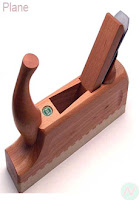 |
| 2. Plane |
Ø Wing / wɪŋ / (উইঙ্) n 1. [one of the large flat parts that stick out from the side of a plane and help to keep it in the air when it is flying] (<বিমানের>ডানা):
2. Wing / wɪŋ / (উইঙ্) n [one of the parts of the body of a bird, insect or bat that it uses for flying] (<পাখি বা পোকামাকড়ে>ডানা): wing feathers
Ø Take off / teɪk ɔːf / (টেইক্ ওফ্) v [(of an aircraft, bird or insect) to leave the ground and begin to fly] (<বিমান, পাখি বা পোকামাকড়>উড়াল দেওয়া): The plane took off an hour late.
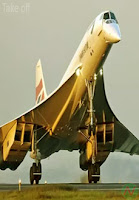 |
| Take off |
<NOUN> Take-off [the moment at which an aircraft leaves the ground and starts to fly] (বিমান উড়াল দেওয়ার মুহূর্ত): Flight take-off and landings are banned at this airport.
Ø Land / lænd / (ল্যান্ড্) v {lands / lændz / (ল্যান্ড্য্); Pt. Pp. landed} [(of bird, plane, and insect) to come down through the air onto the ground or another surface] (<বিমান, পাখি বা পোকামাকড়>মাটি স্পর্শ করা বা অবতরণ করা): The plane landed safely.
Ø Board / bɔːrd / (বোর্ড্) v {Pt. Pp. boarded} [to get on a ship, train, plane, bus, etc.] (<জাহাজ, ট্রেন, বাস বা প্লেনে>আরোহণ করা বা উঠা): At Dhaka airport, he boarded a plane to Australia.
Ø Fly / flaɪ / (ফ্লাই) v {flies / flaɪz / (ফ্লাইয্); Pt. flew / fluː / (ফ্লূ); Pp. flown / floʊn / (ফ্লৌন্)} [when a bird, insect or aircraft flies, it moves through the air] (ওড়া; উড়ে যাওয়া): They were on a plane flying from London to New York.
Airliner
Airliner / ˈerlaɪnər / (ˈএঅরলাইনএর্) n [a large aircraft that carries passengers] (সুবিশাল যাত্রীবাহী বিমান):
Ø Aircraft / ˈerkræft / (ˈএঅরক্র্যাফট্) n [any vehicle, with or without an engine, which can fly and carry goods or passengers, such as a plane or helicopter] (উড়োজাহাজ; বিমানপোত): fighter/transport/military aircraft
Glider
Glider / ˈglaɪdər / (ˈগ্লাইডএর্) n [a light aircraft without an engine and with long fixed wings, which flies by gliding] (ইনজিনবিহীন বিমান):
Seaplane
Seaplane / ˈsiːpleɪn / (ˈছীপ্লেইন্) n {US hydroplane} [a plane that can take off from and land on water] (সামুদ্রিক উড়োজাহাজ):
Microlight
Microlight / ˈmaɪkroʊlaɪt / (ˈমাইক্রৌলাইট্) n {US ultralight} [a very small light aircraft with a very small engine, which carries only one or two people] (মাইক্রৌলাইট):
Helicopter
Helicopter / ˈhelɪkɑːptər / (ˈহেলিকাঃপ্টএর্) n [a type of aircraft without wings, that has one or two sets of large blades which go round very fast on top. It can land and take off vertically and can stay in one place in the air] (হেলিকপ্টার): The helicopter hovered above the airstrip. The injured were ferried to hospital by helicopter.
Ø Hover / ˈhʌvər / (ˈহাভএর্) v {Pt. Pp. hovered} [(of birds, helicopters, etc.) to stay in one place in the air, usually by moving the wings quickly] (<পাখি বা বিমান সম্বন্ধে>বাতাসে স্থির হয়ে বা ভেসে থাকা): A police helicopter hovered overhead.
Hot-Air Balloon
Hot-air balloon / hɑːt-ˈer bəluːn / (হাঃট্-ˈএর বএলূন্) n [an aircraft consisting of a very large bag filled with heated air or other gas, with a basket (= container) hanging under it in which people can ride] (হট-এইর বেলূন):
Ø Balloon / bəˈluːn / (বএˈলূন্) n [a small, very thin rubber bag that you blow air into or fill with a light gas until is round in shape, used for decoration at parties or as a children’s toy] (বেলুন): My balloon has burst!
Rocket
Rocket / ˈrɑːkɪt / (ˈরাঃকিট্) n 1. [a spacecraft in the shape of a tube that is driven by a stream of gases let out behind it when fuel is burned inside] (মহাকাশ যান; রকেট): They launched a rocket to the planet, Venus.
2. Rocket / ˈrɑːkɪt / (ˈরাঃকিট্) n [a type of firework that goes high into the air and then explodes with colored lights] (রকেট পটকা):
Ship/Vessel
Ship / ʃɪp / (শিপ্) n [a large boat that carries people or goods, especially across the sea] (জাহাজ; পোত): The captain went down with his ship. The Dockers were loading the cargo onto the ship. The ship anchored in the bay. Their ship lay at anchor at the mouth of the harbor. The ship was in the dock. A sailing/cruise/merchant/naval ship
Vessel / ˈvesl / (ˈভেছ্ল্) n 1. [a large ship or boat] (বৃহৎ জাহাজ বা নৌকা): A salvage team railed to refloat the vessel. A cargo/fishing/patrol/supply vessel
2. Vessel / ˈvesl / (ˈভেছ্ল্) n [a tube that carries blood through the body of a person or an animal, or liquid through the parts of a plant] (রক্তবাহী শিরা বা ধমনী): broken blood vessels
<VERB> Ship/ ʃɪp / (শিপ্) v {Pt. Pp. shipped / ʃɪpt / (শিপ্ট্)} [to send or transport Sb/Sth by ship or by another means of transport] (<জাহাজে করে>সমুদ্র পথে পাঠানো): The company ships its goods all over the world.
Ø <PHR-V> Go down {SYN sink} [Sth disappear below the water] (ডুবে যাওয়া): Everyone look to the lifeboats when the ship started to go down (=sink).
Ø Docker / ˈdɑːkər / (ˈডাঃকএর্) n {Also dockworker} [a person who works at a port, putting goods onto and taking them off ships] (জাহাজ শ্রমিক):
Ø Cargo / ˈkɑːrgoʊ / (ˈকাঃর্গৌ) n [the goods carried in a ship or plane] (<জাহাজ, বিমান ইত্যাদিতে বাহিত> পণ্য; মাল): a cargo ship
Ø Anchor / ˈæŋkər / (ˈএ্যাঙ্কএর্) v [to let an anchor down from a boat or ship in order to prevent it from moving away] (নঙ্গরের সাহায্যে জাহাজকে নিরাপদ বা সংরক্ষিত করা; নঙ্গর ফেলা): We anchored off the coast of Spain.
 |
| Anchor |
<NOUN> Anchor / ˈæŋkər / (ˈএ্যাঙ্কএর্) n [a heavy metal object that is attached to a rope or chain and dropped over the side of a ship or boat to keep it in one place] (নঙ্গর): to drop anchor
Ø Harbour / ˈhɑːrbər / (ˈহাঃর্বএর্) n {US harbor} [an area of water next to the coast, protected from the open sea by strong walls, where ships can shelter] (পোতাশ্রয়): Several boats lay at anchor in the harbor.
Ø Dock / dɑːk / (ডাঃক্) n {Also jetty} [a part of a port where ships are repaired, or where goods are put onto or take off them] (জাহাজ ঘাট যেখানে মাল খালাস করা ও উঠানো হয়): an outburst from the dock
Ø Merchant / ˈmɜːrtʃənt / (ˈমা্র্চএন্ট্) n [a person who buys and sells goods in large quantities, especially one who imports and exports goods] (<বিশেসত বৈদেশিক বানিজ্যের> বণিক): a merchant ship
Liner
Liner / ˈlaɪnər / (ˈলাইনএর্) n [a large ship for carrying passengers in great comfort on long journeys] (যাত্রীবাহী জাহাজ): a luxury cruise liner
Ferry
Ferry / ˈferi / (ˈফেরি) n [a boat or ship for taking passengers and often vehicles across an area of water, especially as a regular service] (খেয়াতরী; ফেরি): We took the ferry to Calais.
<VERB> Ferry / ˈferi / (ˈফেরি) v {ferries / ˈferiz / (ˈফেরিয্); Pt. Pp. ferried / ˈferid / (ˈফেরিড্)} [to transport people or goods in a vehicle, especially regularly and often] (পারাপার করা বা আনানেওয়া করা): The children need to be ferried to and from school.
Launch
Launch / lɔːntʃ / (লোঞ্চ্) n [a boat which has an engine and carries passengers for short distances, especially on a lake or a river, or from the land to a large boat] (<নদী বা হ্রদে ব্যবহৃত যাত্রীবাহী>বড়ো নৌকা; লঞ্চ):
Lifeboat
Lifeboat / ˈlaɪfboʊt / (ˈলাইফ্বৌট্) n [a large boat which is kept ready to go out sea and save people who are in danger, or a smaller boat kept on a ship for people to leave in if the ship is not safe or might sink] (লাইফ বৌট): The lifeboat is stationed just along the coast from here.
Hovercraft
Hovercraft / ˈhʌvərkræft / (ˈহাভএর্ক্র্যাফট্) n [a vehicle that travels just above the land or water by keeping close to the surface and producing a current of air under it to support it] (জল ও স্থলে চলনক্ষম যানবিশেষ; প্লবযান):
Cruiser
Cruiser / ˈkruːzər / (ˈক্রূজএর্) n {Also cabin cruiser} [a boat with a motor and room for people to sleep, used for pleasure trips] (শয্যাসজ্জিত প্রমোদতরী): a luxury 20-foot cabin cruiser
Submarine
Submarine / ˌsʌbməˈriːn / (ˌছাব্মএˈরীন্) n [a ship that can travel underwater] (ডুবজাহাজ): submarines carrying nuclear warheads
Motorboat
Motorboat / ˈmoʊtərboʊt / (ˈমৌটএর্বৌট্) n [a usually small and often fast boat which is driven by an engine] (যন্ত্র চালিত নৌকা):
Speedboat
Speedboat / ˈspiːdboʊt / (ˈস্পীড্বৌট্) n [a small boat which has a powerful engine and which travels very fast] (স্পিডবৌট):
Boat
Boat / boʊt / (বৌট্) n [a vehicle (smaller than a ship) that travels on water, moved by oars, sails or a motor] (নৌকা): Boats were anchored two and three abreast. He was adrift in an open boat for three days. The boat chugged out to sea. |
| Oar |
Ø Sail / seɪl / (ছেইল্) n [a sheet of strong cloth which the wind blow against to make a boat or ship travel through the water] (পাল): The vessel can be propelled by oars or sail. To hoist/lower the sails
<VERB> Sail / seɪl / (ছেইল্) v {Pt. Pp. sailed} [(of a boat or ship or the people on it) to travel on water using sails or an engine] (পাল খাটিয়ে বা ইনজিনের সাহায্যে সাগরে বা হ্রদে এগিয়ে চলা): The boat sailed along/down the coast.
Ø Abreast / əˈbrest / (এˈব্রেস্ট্) adv [next to Sb/Sth and facing or moving in the same direction] (<মানুষ বা জাহাজ>পাশাপাশি): We were running/cycling two abreast.
Ø Adrift / əˈdrɪft / (এˈড্রিফট্) adj [if a boat is adrift, it is moving on the water but is not controlled by anyone because of a problem] (<জাহাজ বা নৌকায়>ভাসমান; ভাসন্ত): The survivor were adrift in a lifeboat for six days.
Ø Chug / tʃʌg / (চাগ্) v {Pt. Pp. chugged} [to make the sound of an engine or motor, or to move to make this sound] (<তেল চালিত ইনজিন>ভট ভট শব্দ করা): The boat chugged down the river.
Canal Boat
Canal boat / kəˈnæl boʊt / (কএˈন্যাল্ বৌট্) n [a long narrow boat used on canals] (খালে চালিত লম্বা সরু নৌকাবিশেষ; ছিপ নৌকা):
Catamaran
Catamaran / ˌkætəməˈræn / (ˌক্যাটএমএˈর্যান্) n [a sailing boat that has two parallel hulls (= floating ports) held together by a single deck] (দুই কাঠামো বিশিষ্ট কাঠের ভেলাবিশেষ):
Rowing Boat
Rowing boat / ˈroʊɪŋ boʊt / (ˈরৌইঙ্ বৌট্) n {Also rowboat} [a small boat that is moved by pulling oars through the water] (দাঁড়ের নৌকা; বাইচের নৌকা): A rowing boat rowed around the island.
Ø Row / roʊ / (রৌ) v {Pt. Pp. rowed} [to move a boat through water using oars] (দাঁড় বেয়ে নৌকা চালানো): The wind dropped, so we had to row the boat back home.
Canoe
Canoe / kəˈnuː / (কএˈনূ) n [a small light narrowboat, pointed at both ends and moved using a paddle] (ডিঙি-জাতীয় নৌকাবিশেষ): We crossed the lake by canoe.
Yacht
Yacht / jɑːt / (ইঅট্) n {US sailboat} [a boat with sails and sometimes an engine, used for either racing or traveling on for pleasure] (হালকা নৌযান যা বিশেষত প্রতিযোগিতার সময় ব্যবহ্রত হয়): a yacht club/race
Dinghy
Dinghy / ˈdɪŋi / (ˈডিঙি) n [a small open boat] (ডিঙি-নৌকা): The crew was taken to shore in an inflatable dinghy.
Ø Inflatable / ɪnˈfleɪtəbl / (ইনˈফ্লেইটএব্ল্) n [a boat or something similar which must be filled with air in order to float on the water] (বাতাস দ্বারা ফুলানো): an inflatable mattress/boat
Kayak
Kayak / ˈkaɪæk / (ˈকাইএ্যাক্) n [a light canoe in which the part where you sit is covered over] (কাইঅ্যাইক):
Punt
Punt / pʌnt / (পান্ট্) n [a long shallow boat with a flat bottom and square ends which is moved by pushing the end of a long pole against the bottom of a river] (লগি ঠেলে চালাতে হইয় এমন সমতল তলাওয়ালা নৌকা বিশেষ; লগি নৌকা):
Ø Shallow / ˈʃæloʊ / (ˈশ্যালৌ) adj [not having much distance between the top or surface and the bottom] (অগভীর):
Ø Pole / poʊl / (পৌল্) n 1. [a long thin stick of wood or metal, often used standing straight up in the ground to support things] (দণ্ড বা খুটি; লগি): a tent pole
2. Pole / poʊl / (পৌল্) n [a person from Poland] (পৌল্যান্ড দেশের লোক):
Gondola
Gondola / ˈgɑːndələ / (ˈগাঃন্ডএলএ) n [a narrowboat with a raised point at both ends, which is used on canals in Venice and is moved by a man with a pole] (ভেনিস শহরের খালে ব্যবহার করা লম্বা সরু নৌকা বিশেষ; ভেনিস-নৌকা):
Pedalo
Pedalo / ˈpedəloʊ / (ˈপেডএলৌ) n [a small pleasure boat that you move through the water by pushing with your feet] (আনন্দের জন্য ব্যবহ্রত পাচালিত নৌকা বিশেষ):
Raft (=ভেলা )
Raft / ræft / (র্যাফট্) n [a flat floating structure for traveling across the water, often made of pieces of wood tied roughly together and moved along with a paddle] (ভেলা): We lashed together anything that would float to make a raft.
Ø Float / floʊt / (ফ্লৌট্) v {Pt. Pp. floated} [to stay on the surface of a liquid and not sink] (ভাসা; ভেসে থাকা/যাওয়া): An empty bottle will float.
<SYN> Drift
Ø Lash / læʃ / (ল্যাশ্) v {Pt. Pp. lashed} [to hit Sb/Sth with great force] (জোরে আঘাত করা): The rain lashed at the windows.
<SYN> Pound
She was pushing her baby along in a pram.
Rickshaw
Rickshaw / ˈrɪkʃɔː / (ˈরিক্শো) n [a small light vehicle with two wheels which is usually pulled by one person] (রিকসা): The rickshaw is pulled by Sb walking or riding a bicycle.
Cart
Cart / kɑːrt / (কাঃর্ট্) n [a vehicle with two or four wheels that is pulled by a horse/cattle and used for carrying loads] (গরু বা ঘোড়া গাড়ি): An ox cart made its way through the village. A shopping/horse/golf cart
Carriage
Carriage / ˈkærɪdʒ / (ˈক্যারিজ্) n [a vehicle, usually with four wheels, that is pulled by one or more horses and was used in the past to carry people] (চার চাকার ঘোড়ার গাড়ি): They could hear the sound of carriage wheels on the gravel.
Sledge
Sledge / sledʒ / (স্লেজ্) n {US sled} [a vehicle for traveling over snow and ice, with long narrow strips of wood or metal instead of wheels, larger sledges are pulled by horses or dogs and smaller ones are used for going down hills as a sport or for pleasure] (বরফের উপর চলাচলের জন্য ব্যবহ্রত চাকাহীন গাড়িবিশেষ; স্লেজ-গাড়ি):
Sleigh
Sleigh / sleɪ / (স্লেই) n [a type of sled, especially one pulled by horses or dogs] (ঘোড়া বা কুকুর টানা স্লেজ-গাড়ি): a sleigh ride
Chariot
Chariot / ˈtʃæriət / (ˈচ্যারিএট্) n [a two-wheeled open vehicle that was used in ancient times for racing and fighting and was pulled by a horse] (রথ):
Handcart
Handcart / ˈhændkɑːrt / (ˈহ্যান্ড্কাঃর্ট্) n [a small vehicle with two wheels and two long handles which is used for carrying goods, and is pushed or pulled with your hands] (<হাতের>ঠেলা গাড়ি):
Trolley
Trolley / ˈtrɑːli / (ˈট্রাঃলি) n {US cart} [a small vehicle with two or four wheels that you push or pull to transport large or heavy objects on] (চার চাকার ঠেলা গাড়ি; ট্রলি): The hospital is so overcrowded that some patients are being treated on trolleys in the corridors. The waiter was pushing a laden sweet trolley towards our table. A shopping/luggage trolley
Wagon
Wagon / ˈwægən / (ˈওএ্যাগএন্) n [a vehicle with four wheels, pulled by horses or oxen and used for carrying heavy loads] (ওয়াগন): The first white settlers journeyed across America in covered wagons.
Pram
Pram / præm / (প্র্যাম্) n {US baby carriage} [a small, light vehicle for moving a baby around which consists of a small bed supported by a frame on four wheels] (<বাচ্চাদের>ঠেলনি <গাড়ি>):She was pushing her baby along in a pram.
Pushchair
Pushchair / ˈpʊʃtʃer / (ˈপূশ্চেএর্) n {US stroller} [a small folding seat on wheels in which a small child sits and is pushed along] (<বাচ্চাদের>ঠেলনা):
Carrycot
Carrycot / ˈkærikɑːt / (ˈক্যারিকাঃট্) n {US bassinet} [a container shaped like a rectangular box with two handles, in which a baby can be carried] (বাচ্চাদের বহণের জন্য হাতল আলা ছোট দোলনা):
Learn Vehicles Names in English | Transportation Vocabulary
Noted from Google Image; Oxford & Cambridge Dictionary


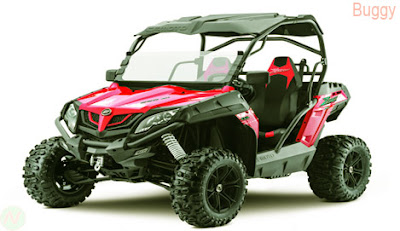






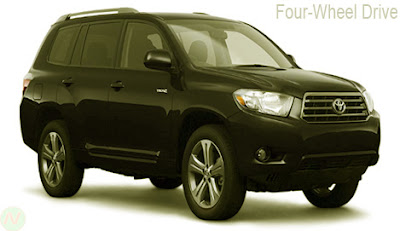









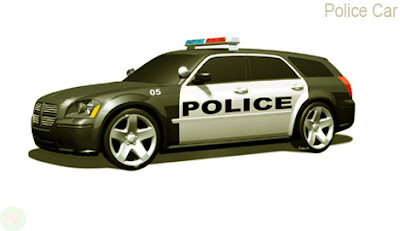
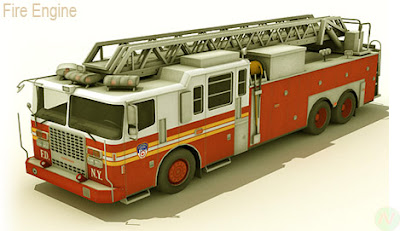

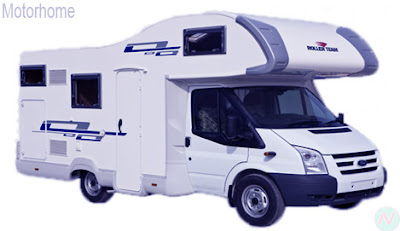



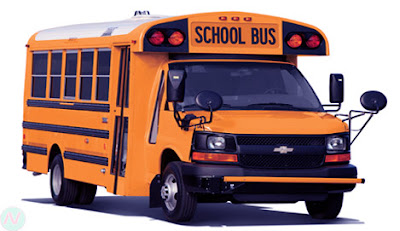
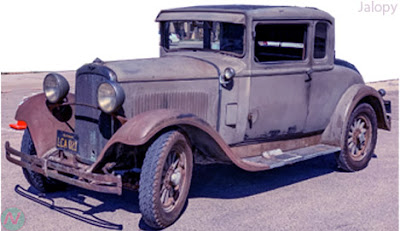

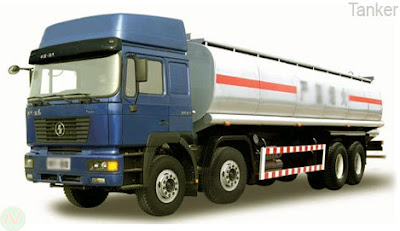




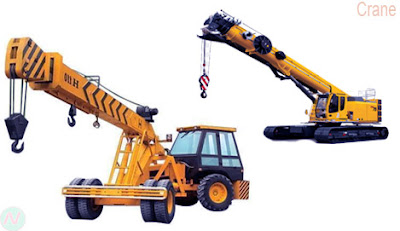
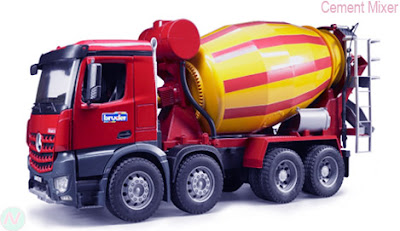










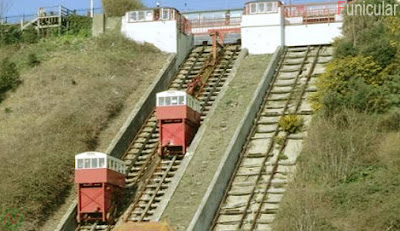
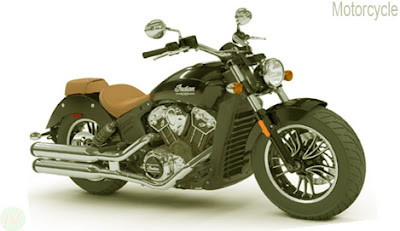








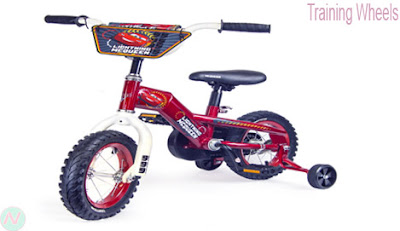





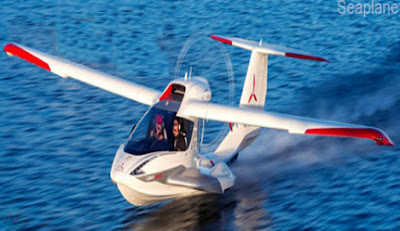

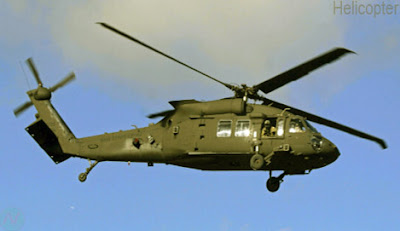



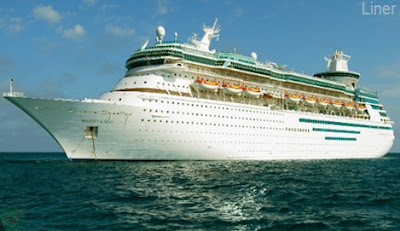
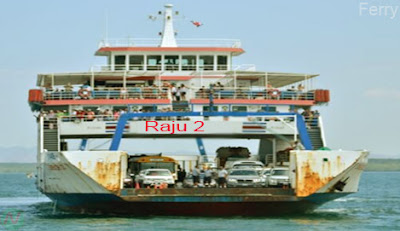




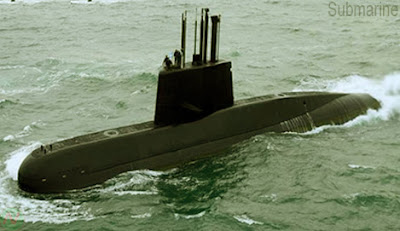

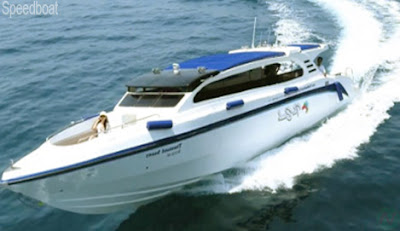

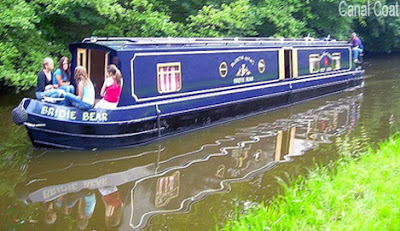

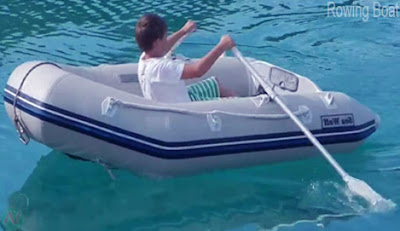
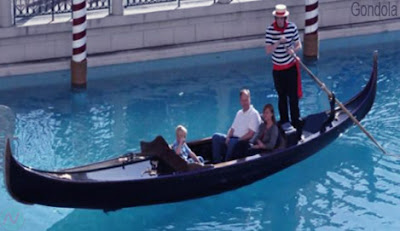

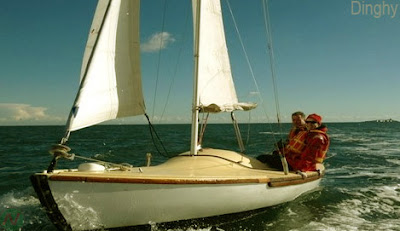




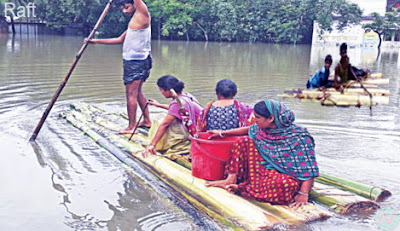
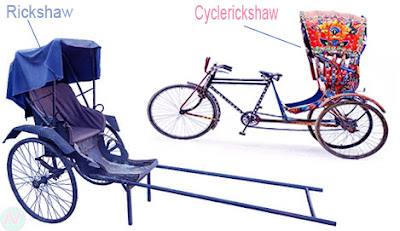


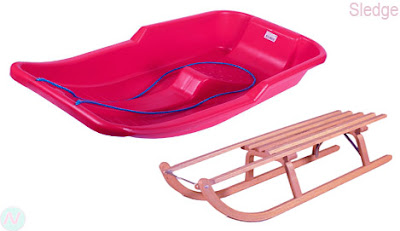
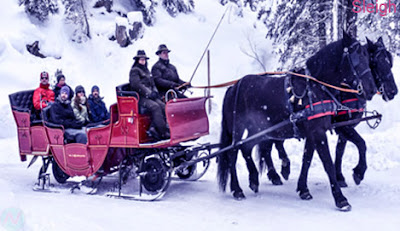



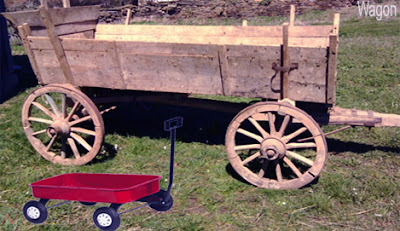
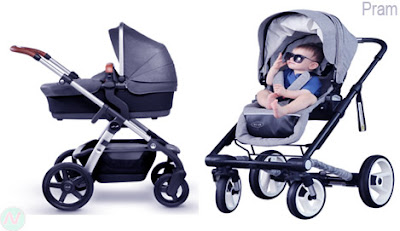
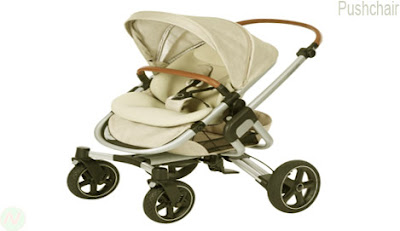











No comments